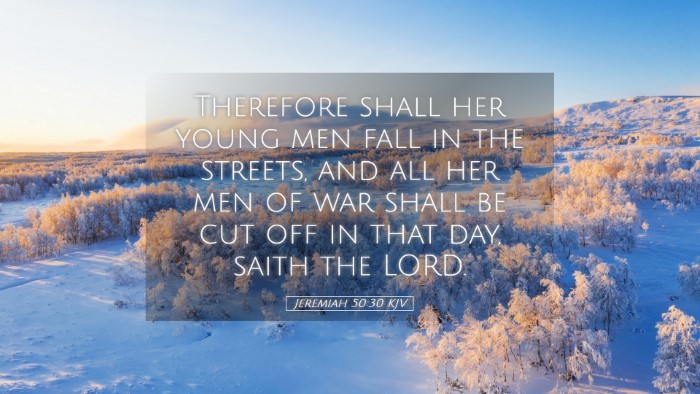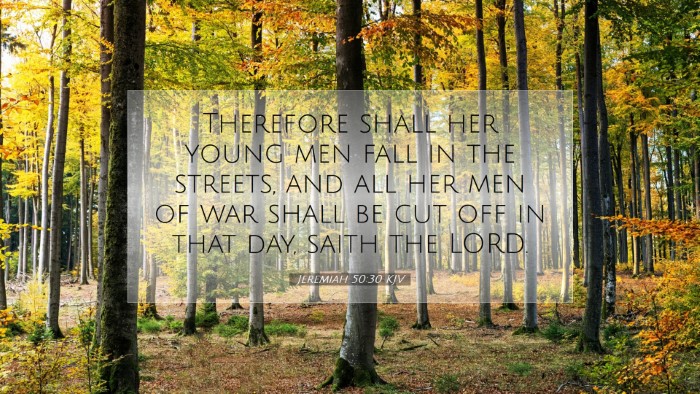Commentary on Jeremiah 50:30
Jeremiah 50:30 states:
"Therefore shall her young men fall in the streets, and all her men of war shall be cut off in that day, saith the Lord."
This verse is part of a larger prophetic message concerning the judgment that God will enact upon Babylon. In this commentary, we draw insights from established public domain commentaries, providing a rich theological framework for understanding this verse.
Context and Significance
The book of Jeremiah is predominantly concerned with the imminent judgment that would come upon Israel and her surrounding nations. In this passage, Jeremiah prophesies doom against Babylon, which is depicted as a significant adversary of God's people.
Overview of Babylon's Judgment
-
Historical Background:
Babylon had risen to power as a significant world empire, known for its military prowess and cultural achievements. However, morally and spiritually, Babylon was in opposition to God. During the time of Jeremiah, Babylon was utilized by God as a tool for judgment against Israel (Judah), yet, eventually, it too would face divine retribution.
-
Theological Implications:
This verse exemplifies the justice of God. It serves as a reminder that although nations may seem overwhelming, divine justice will prevail. Young men, representing the future strength of Babylon, falling in the streets symbolizes the utter defeat and desolation that would come upon this great city.
Commentary Insights
Matthew Henry's Perspective
Matthew Henry, in his exegesis, emphasizes the abruptness of Babylon's downfall. He remarks on how God's judgment will come upon the young men, representing both literal soldiers and the vitality of Babylon as a city. Henry notes:
"The young men are slain in the streets; this is the ruin of the state, when the defenders are cut off and the oppressed are left defenseless."
Henry draws attention to the prophetic nature of the passage, indicating that the defeat of Babylon is irrevocable. It serves not only as a historical account but also as a spiritual warning to nations today about the consequences of defying God.
Albert Barnes on Divine Retribution
Albert Barnes provides an extensive doctrinal view of the text. He highlights that the phrase "in that day" signifies a specific time determined by God for judgment. Barnes writes:
"The mention of young men falling in the streets indicates a total collapse of military might and societal order."
He elaborates on the significance of the 'young men' as they embody hope and strength, suggesting that their demise symbolizes a loss of vitality for the entire empire. Furthermore, Barnes reiterates the sovereign nature of God, asserting that Babylon's fall is not a mere accident but an intentional act of divine will.
Adam Clarke’s Exegesis
Adam Clarke examines the passage with a focus on historical context and linguistic nuances. He notes that:
"The powerful armies and celebrated soldiers of Babylon would be reduced to mere shadows of their former selves—the caption of defeat echoes throughout the land."
Clarke also emphasizes that this devastating outcome is a product of the moral decline within Babylon, citing their idolatry and oppression of God’s people as catalysts for God’s fierce judgment. He suggests that this foreshadows not just the physical destruction of Babylon but also spiritual desolation.
Lessons for Contemporary Believers
-
The Seriousness of Sin:
This verse reminds contemporary believers of the serious implications of national sin and moral decay. Just as Babylon faced destruction due to its repeated transgressions, modern cultures must heed the call for repentance.
-
God's Sovereignty in History:
The prophetic word illustrates how God is sovereign over nations and their destinies. Believers can find assurance in the knowledge that God governs history according to His divine purposes.
-
The Call for Vigilance:
As God's people, there is a strong exhortation to remain vigilant and faithful. The desolation of Babylon serves as a warning of the consequences of turning away from God.
Conclusion
Jeremiah 50:30 stands as a stark reminder of God's judgment against the sin of nations. The insights from Matthew Henry, Albert Barnes, and Adam Clarke converge to illuminate the themes of divine retribution, the vulnerability of human strength, and the sovereignty of God. For pastors, students, theologians, and scholars, this commentary serves as a deep well of theological reflection, challenging us to reflect on God's holiness and justice.


